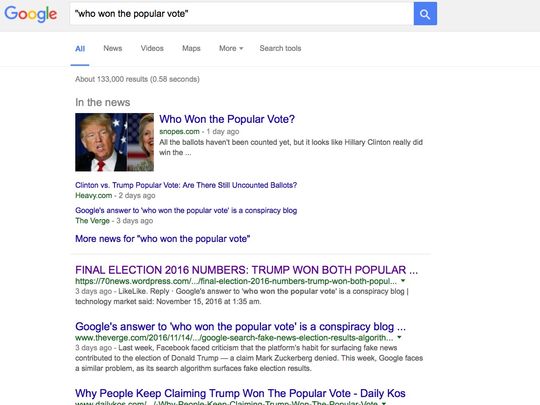I have recently been inundated by a growing number of fake news. Half of them are generated by sites supporting political ideas or people. The rest are just leveraging on my curiosity or on my empathy. The first category may appear a legitimate attempt to promote what would be a recommended best choice. Unfortunately that is rarely true.

During the American election it was discovered that a good share of web sites promoting ideas close to what Trump’s supporters would concur with, were just small commercial enterprises based around the world. BuzzFeed News identified more than 100 pro-Trump websites being run from a single town in Macedonia. The aim was just to fish viewers so as to generate ad revenues. This is the impact of click-bait economy: the content does not matter, just the number of clicks.
Editors of other sites – and of ad-hoc Facebook accounts – just search the net for current or past stories whose content can be plagiarized, maybe changing location and date, to solicit the viewer to read the story. In most cases the link brings to a page containing a few lines of text and lots of ads. To read an entire article one may have to click several times to go to the following page. Unfortunately, even legitimate online political magazines have access to the same revenue sources. But, how much can be earned paying this game? According to Mani Gandham, the content itself, especially at 1 article a day, is not going to get anywhere near enough traffic to matter these days. They’ll probably make cents, or maybe dollars on the high end, per month. Many clickbait sites, however, aren’t about the content but about playing the ad industry through arbitrage and fraud.
But, how much can be earned paying this game? According to Mani Gandham, the content itself, especially at 1 article a day, is not going to get anywhere near enough traffic to matter these days. They’ll probably make cents, or maybe dollars on the high end, per month. Many clickbait sites, however, aren’t about the content but about playing the ad industry through arbitrage and fraud.
Google has a leading role in this business. This year, Google will generate $57.80 billion in total digital ad revenue worldwide, an increase of 9.0% over last year. Every time someone does a search on Google, an AdWords auction is created. Advertisers bid on keywords in order to serve an ad which, when clicked upon, leads the searcher to a website landing page where a conversion goal, such as a lead generation or purchase, can be completed. The Google AdWords auction is based around two fundamental elements: keywords and cost-per-click (CPC) bidding. When any user clicks on your ad that appears in the search results, you get paid by Google.
A key role in phishing is played by headlines. Both to attract interest and because of included keywords that will increase the probability for the story to appear high among search results. Is this a problem if the author does not have a great imagination and deep knowledge of how search engines work? Of course not. There are many sites where you just insert your possible headline and you will get one optimized for the purpose.
For instance, Poynter mentions “Clickbait Headline Generator“, which quickly gives you content like “Is Netflix CEO Reed Hastings getting high with Vladimir Putin?” and “Is John Kerry teasing Ben Affleck at your parents’ place?”
Throw some pictures under them, fire up Chartbeat and watch your Christmas bonus grow!
Actually, the headline of this post is a hook, generated with one of the online services. The original headline was “Fake news and click bait are a plague.” If you are still looking for ten commandments just stop reading.
Can anything be done aside from debunking ourselves each story that may be part of a perception campaign, or spreading fake stories? There are indeed online tools that can be of help. If you use Chrome as browser, you can install the extension Stop Clickbait. This extension works across multiple websites to identify clickbait content and notify it to the user. The user can block similar clickbait content (which works similar to adblock). It also has the option to remain undetected links as clickbait. The user can also report misclassified links which are detected as clickbait as not clickbait which helps in improving the extension. Currently works only on links in Facebook and Twitter.

Something indeed is moving. Google announced Monday night that it will stop allowing fake news sites to use its ad software. Facebook followed with a similar policy. “In accordance with the Audience Network Policy, we do not integrate or display ads in apps or sites containing content that is illegal, misleading or deceptive, which includes fake news,” Facebook said in a statement. They certainly do it for commercial, not ethic reasons. Losing credibility means losing clicks, hence ads revenue. But maybe there is some light at the end of the tunnel.
Suggest to read also
https://wordpress.com/read/feeds/417235/posts/1228282856 and
https://wordpress.com/read/feeds/417235/posts/1224406075